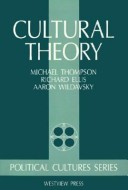Why do people want what they want? Why does one person see the world as a place to control, while another feels controlled by the world? A useful theory of culture, the authors contend, should start with these questions, and the answers, given different historical conditions, should apply equally well to people of all times, places and walks of life. Taking their cue from the pioneering work of anthropologist Mary Douglas, the authors of "Cultural Theory" have created a typology of five ways of life - egalitarianism, fatalism, individualism, hierarchy, and autonomy - to serve as an analytic tool in examining people, culture and politics. They then show how cultural theorists can develop large numbers of falsifiable propositions. Drawing on parables, poetry, case studies, fiction, and the Great books, the authors illustrate how cultural biases and social relationships interact in particular ways to yield life patterns that are viable, sustainable, and ultimately, changeable under certain conditions.
The authors compare "Cultural Theory" with the thought of master social theorists from Montesquieu to Stinchcombe and then reanalyse the classic works in the political culture tradition from Almond and Verba to Pye. Demonstrating that there is more to social life that hierarchy and individualism, the authors offer evidence from earlier studies showing that the addition of egalitarianism and fatalism facilitates cross-national comparisons.
- ISBN10 081337863X
- ISBN13 9780813378633
- Publish Date 18 June 1990
- Publish Status Out of Stock
- Out of Print 10 November 1994
- Publish Country US
- Publisher Taylor & Francis Inc
- Imprint Westview Press Inc
- Format Hardcover
- Pages 296
- Language English
